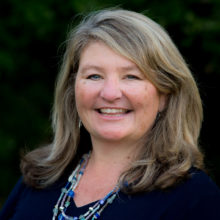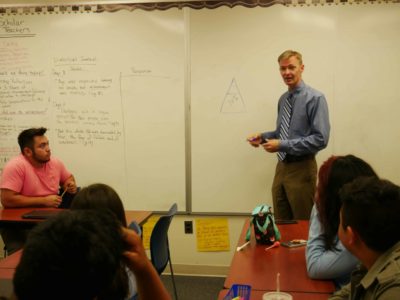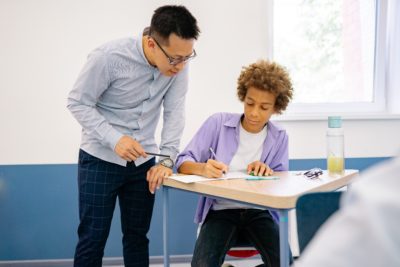

I’ve been in many social and work situations recently where people are talking about how complicated the world is or worse, what a mess it all is. People are discussing what our kids have to worry about compared to what it was like when we were growing up. I’m even hearing about how kids are so fascinated by the new Top Gun movie because they watched the original based in the 80’s. They want to know what it was like when we were growing up. My college-age son even sincerely asked me if we had school shootings when I was a kid.
As I have tried to process the last couple of years and even the last couple of weeks through my education lens — from Uvalde, to the nicknamed “Don’t Say Gay” legislation (HB 755), to the term learning loss, to volatile school board meetings, to the exhaustion of teachers and the polarization of our government, I often come away with a sense of overwhelming complexity, noting layer after layer of all that needs to happen.
But, this weekend, after more discussions, many with students, I left with a very different thought.
Yes, educating our wonderfully diverse students is very complicated. But, in terms of what we, as a state and a government, need to do, it’s actually very, very simple. Yes, simple.
We must simply put our kids and their needs first. When we look at all that is happening, we rarely hear our kids centered as the primary focus of the discussions. Our kids are the very people who will shape our world, our economy, and our communities in the decades to come. However, they will also inherit what we create. They will live with the challenges, trauma, or opportunities we give them.
The simple part is this. If we truly look at what research is telling us about what our kids need to succeed in college, career, and citizenship (and thus help our economy and communities thrive), we have a clear path forward. Interestingly, we are doing this in one area — the science of reading. We have looked at the research, we have seen examples of this in practice, and we are moving forward in an effort to equip our educators with the tools and resources they need to ensure that our students have access to high-quality and effective reading instruction. The same leaders who are moving forward with the science of reading — leaders from both sides of the aisle — have an opportunity and a responsibility to follow the research on what else we need for kids. We must ensure that:
- Every child has access to high-quality, effective teachers:
Teachers are the No. 1 school-related factor that impacts student learning. Every child in North Carolina deserves high-quality and well prepared educators. We must value the profession, the credentials required, and support our pre- and in-service teachers. Working conditions and teacher pay are important components of this. Our legislature, with $4.5 billion more than expected (on top of a significant surplus in the biennium), has the resources to do this right. Teachers do not need $13 or $100 more per paycheck. They need significant raises that help them afford to live in the communities they serve, that help them afford child care so they can teach, and that honor the education, credentials, and skills they bring to our schools every day. To attract and retain a diverse, highly effective teacher workforce, we have to trust and pay our teachers. - Our students feel physically safe:
Research shows us that our students must feel safe in order to learn. Right now, our students wonder if they are safe in their schools. They see the same news and posts that we do. We have an opportunity to follow what our constituents say they want — to ensure that gun safety is a part of our efforts as a state. Our students cannot learn if they do not feel safe. The safety of our students and educators must be prioritized over the disagreements among the adults who have the power to impact our schools. - Our students feel supported:
Feeling safe and supported goes beyond the physical and includes mental and emotional safety. Students must be able to be themselves and to feel safe with the teachers and others in their schools. When we try to prohibit our students from having culturally-responsive, age appropriate curriculum, we are sending a strong message that their family make-up or how they might identify is not acceptable. Limiting their ability to see themselves in the curriculum and to have discussions about world issues, including race or gender-related topics, in a safe setting with a high-quality and well-prepared teacher affects their ability to be ready to learn and thrive. - Districts and schools can meet the needs of every student:
Our principals are the second most important school-related factor (only to teachers) that impact student outcomes. We must pay them at a market rate and provide them with the human and fiscal resources they need to support our educators and students. We must not only add to their plates, but also remove requirements. We must create systems in which they can have the other staff members they need and the salary schedules to hire them. We cannot force them to have bake sales to afford materials and books. Similarly, our superintendents and district leaders are responsible for major organizations, often with thousands of employees and tens of thousands of students. We must trust them to lead well and respect the structures in place to guide them in their work.
We must honor the role our public schools play in our community and the right to a sound basic education afforded by our state constitution. I was reminded nearly every day during the pandemic that our schools are the hubs of our communities. They were the very glue that kept people connected, kept our students fed, and ensured that families knew that someone cared for them. Our schools are the center of our rural, suburban, and urban communities; and we must do what research shows us is needed. Our lawmakers are often quick to complain about our schools, but we have yet to come even close to providing the human and fiscal resources, following the research, or implementing the Leandro comprehensive remedial plan to allow them to do what they are ready and able to do — to provide high-quality and equitable education for our students.
The jobs of our educators and principals are, in fact, very complicated. Working with human beings — families and children — places many demands and opportunities before us. But, what our state leaders need to do is not complicated at all. We have a huge surplus, we have the research, and we have the data showing where we fall short. I’m going to stop saying it’s so complicated because it is not. The answers are actually very easy — and doable. The only thing stopping our legislators and decision-makers is the will to follow the data, to follow the research, and to provide our schools with the very resources and researched-based practices that any business would insist upon having.
We can hide behind excuses of complexity; but this is simple, North Carolina.




